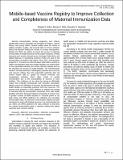| dc.description.abstract | Immunization during pregnancy and infancy
significantly reduces morbidity and mortality of mothers, unborn
fetuses, and young infants. Several studies show the merits of
getting complete, quality, and accurate data on time to enhance
policy and decision-making for society or country development.
Despite the efforts by nations to ensure the success of maternal
immunization through electronic immunization registries, limited
resources such as poor internet access, shortage of electricity, and
digital illiteracy in developing countries hinder the goal of full
immunization of mothers and infants. Since 2015, immunization
programs in Tanzania use internet-based information systems to
collect immunization data from health facilities and submit them
to the responsible authority for further decision-making such as
the allocation of vaccines to health facilities. The internet-based
media is not fully achieved in developing countries due to its cost
and resource setting, thus, the responsible authority does not
receive instant data to update its vaccine inventory and
management activities which often results in partial
immunization due to the unavailability of vaccines in some
facilities. This challenge can be solved by having an affordable
system that instantly incorporates and transmits vaccination
details such as the utilization of vaccines and demands from each
health facility to responsible authority with less resources. The
present study proposes a USSD platform to enhance the receipt
of real-time data by immunization authorities from both health
facilities with poor and good internet connectivity at a lesser cost.
A greater number of health facilities in Tanzania prefer to use
both online and offline platforms for collecting and recording
immunization data. As electronic immunization registry has been
introduced in areas with limited resources, it is recommended the
use online and offline platforms for data collection so that they
can submit immunization data in real-time without the delays
caused by poor resource setting. | en_US |

